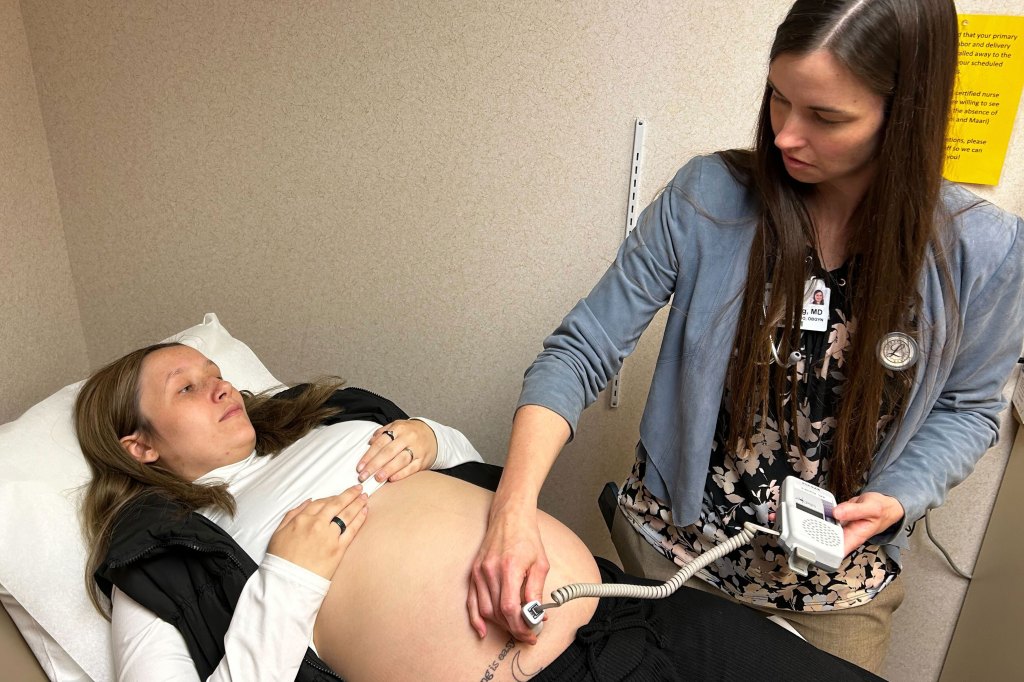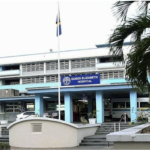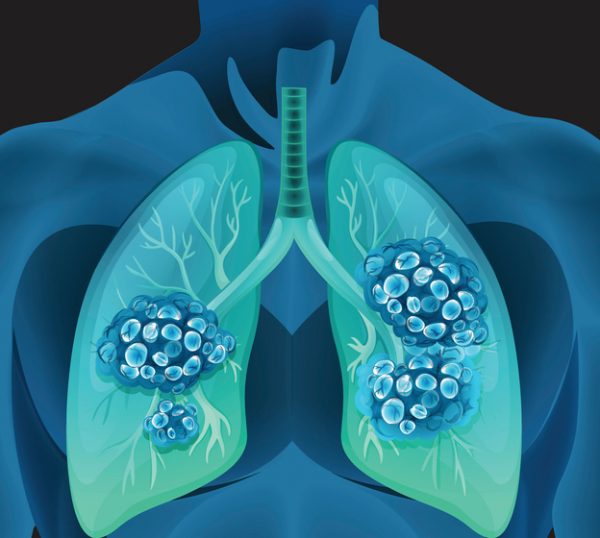Es que el hospital donde se atendía, Winner Regional Health, se ha sumado recientemente al cada vez mayor número de centros de salud rurales que cierran sus unidades de maternidad.
“Ahora va a ser mucho más estresante y complicado para las mujeres recibir la atención médica que necesitan, porque tienen que ir mucho más lejos”, dijo Hofeldt, que tiene fecha de parto de su primer hijo el 10 de junio.
Hofeldt agregó que los viajes más largos suponen más gasto en gasolina y un mayor riesgo de no llegar a tiempo al hospital. “Mi principal preocupación es tener que parir en un auto”, afirma.
Más de un centenar de hospitales rurales han dejado de atender partos desde 2021, según el Center for Healthcare Quality and Payment Reform, una organización sin fines de lucro. El cierre de los servicios de obstetricia se suele achacar a la falta de personal y la falta de presupuesto.
En la actualidad, alrededor del 58% de los condados de Dakota del Sur no cuentan con salas de parto. Es la segunda tasa más alta del país, después de Dakota del Norte, según March of Dimes, una organización que asiste a las madres y sus bebés.
Además, el Departamento de Salud de Dakota del Sur informó que las mujeres embarazadas y los bebés del estado — especialmente las afroamericanas y las nativas americanas— presentan tasas más altas de complicaciones y mortalidad.
Winner Regional Health atiende a comunidades rurales en Dakota del Sur y Nebraska, incluyendo parte de la reserva indígena Rosebud Sioux. El año pasado nacieron allí 107 bebés, una baja considerable respecto de los 158 que nacieron en 2021, contó su director ejecutivo, Brian Williams.
Los hospitales más cercanos con servicios de maternidad se encuentran en pueblos rurales a una hora de distancia, o más, de Winner.
Sin embargo, varias mujeres afirmaron que el trayecto en coche hasta esos centros las llevaría por zonas donde no hay señal de celular confiable, lo que podría suponer un problema si tuvieran una emergencia en el camino.
KFF Health News habló con cinco pacientes de la zona de Winner que tenían previsto que su parto fuera en el Avera St. Mary’s Hospital de Pierre, a unas 90 millas de Winner, o en uno de los grandes centros médicos de Sioux Falls, a 170 millas de distancia.
Hofeldt y su novio conducen cada tres semanas para ir a las citas prenatales en el hospital de Pierre, que brinda servicios a la pequeña capital y a la vasta zona rural circundante.
A medida que se acerque la fecha del parto, las citas de control y, por lo tanto los viajes, tendrán que ser semanales. Ninguno de los dos tiene un empleo que le brinde permiso con goce de sueldo para ese tipo de consulta médica.
“Cuando necesitamos ir a Pierre, tenemos que tomarnos casi todo el día libre”, explicó Hofeldt, que nació en el hospital de Winner.
Eso significa perder una parte del salario y gastar dinero extra en el viaje. Además, no todo el mundo tiene auto ni dinero para la gasolina, y los servicios de autobús son escasos en las zonas rurales del país.
Algunas mujeres también tienen que pagar el cuidado de sus otros hijos para poder ir al médico cuando el hospital está lejos. Y, cuando nace el bebé, tal vez tengan que asumir el costo de un hotel para los familiares.
Amy Lueking, la médica que atiende a Hofeldt en Pierre, dijo que cuando las pacientes no pueden superar estas barreras, los obstetras tienen la opción de darles dispositivos para monitorear el embarazo en el hogar y ofrecerles consulta por teléfono o videoconferencia.
Las pacientes también pueden hacerse los controles prenatales en un hospital o una clínica local y, más tarde, ponerse en contacto con un profesional de un hospital donde se practiquen partos, dijo Lueking.
Sin embargo, algunas zonas rurales no tienen acceso a la telesalud. Y algunas pacientes, como Hofeldt, no quieren dividir su atención, establecer relaciones con dos médicos y ocuparse de cuestiones logísticas como transferir historias clínicas.
Durante una cita reciente, Lueking deslizó un dispositivo de ultrasonido sobre el útero de Hofeldt. El ritmo de los latidos del corazón del feto resonó en el monitor.
“Creo que es el mejor sonido del mundo”, expresó Lueking.
Hofeldt le comentó que quería un parto lo más natural posible.
Pero lograr que el parto se desarrolle según lo planeado suele ser complicado para quienes viven en zonas rurales, lejos del hospital. Para estar seguras de que llegarán a tiempo, algunas mujeres optan por programar una inducción, un procedimiento en el que los médicos utilizan medicamentos u otras técnicas para provocar el trabajo de parto.
Katie Larson vive en un rancho cerca de Winner, en la localidad de Hamill, que tiene 14 habitantes. Esperaba evitar que le indujeran el parto.
Larson quería esperar a que las contracciones comenzaran de forma natural y luego conducir hasta el Avera St. Mary’s, en Pierre.
Pero terminó programando una inducción para el 13 de abril, su fecha probable de parto. Más tarde, la adelantó al 8 de abril para no perderse una venta de ganado muy importante, que ella y su esposo estaban preparando.
“La gente se verá obligada a elegir una fecha de inducción aunque no sea lo que en un principio hubiera elegido. Si no, correrá el riesgo de tener al bebé en la carretera”, afirmó.
Lueking aseguró que no es frecuente que las embarazadas den a luz mientras se dirigen al hospital en automóvil o en ambulancia. Pero también recordó que el año anterior cinco mujeres que tenían previsto tener a sus hijos en Pierre acabaron haciéndolo en las salas de emergencias de otros hospitales, porque el parto avanzó muy rápido o porque las condiciones del clima hicieron demasiado peligroso conducir largas distancias.
Nanette Eagle Star tenía previsto que su bebé naciera en el hospital de Winner, a cinco minutos de su casa, hasta que el hospital anunció que cerraría su unidad de maternidad. Entonces decidió dar a luz en Sioux Falls, porque su familia podía quedarse con unos familiares que vivían allí y así ahorrar dinero.
El plan de Eagle Star volvió a cambiar cuando comenzó el trabajo de parto prematuramente y el clima se puso demasiado peligroso para manejar o para tomar un helicóptero médico a Sioux Falls.
“Todo ocurrió muy rápido, en medio de una tormenta de nieve”, contó.
Finalmente, Eagle Star tuvo a su bebé en el hospital de Winner, pero en la sala de emergencias, sin epidural, ya que en ese momento no había ningún anestesista disponible. Esto ocurrió solo tres días después del cierre de la unidad de maternidad.
El fin de los servicios de parto y maternidad en el Winner Regional Health no es solo un problema de salud, según las mujeres de la localidad. También tiene repercusiones emocionales y económicas en la comunidad.
Eagle Star recuerda con cariño cuando era niña e iba con sus hermanas a las citas médicas. Apenas llegaban, iban a un pasillo que tenía fotos de bebés pegadas en la pared y comenzaban una “búsqueda del tesoro” para encontrar polaroids de ellas mismas y de sus familiares.
“A ambos lados del pasillo estaba lleno de fotos de bebés”, contó Eagle Star. Recuerda pensar: “Mira todos estos bebés tan lindos que han nacido aquí, en Winner”.
Hofeldt contó que muchos lugareños están tristes porque sus bebés no nacerán en el mismo hospital que ellos.
Anora Henderson, médica de familia, señaló que la falta de una correcta atención a las mujeres embarazadas puede tener consecuencias negativas para sus hijos. Esos bebés pueden desarrollar problemas de salud que requerirán cuidados de por vida, a menudo costosos, y otras ayudas públicas.
“Hay un efecto negativo en la comunidad”, dijo. “Simplemente no es tan visible y se notará bastante más adelante”.
Henderson renunció en mayo a su puesto en el Winner Regional Health, donde asistía partos vaginales y ayudaba en las cesáreas. El último bebé al que recibió fue el de Eagle Star.
Para que un centro de salud sea designado como hospital con servicio de maternidad, debe contar con instalaciones donde se pueden efectuar cesáreas y proporcionar anestesia las 24 horas del día, los 7 días de la semana, explicó Henderson.
Williams, el director ejecutivo del hospital, dijo que el Winner Regional Health no ha podido contratar suficientes profesionales médicos con formación en esas especializaciones.
En los últimos años, el hospital solo había podido ofrecer servicios de maternidad cubriendo aproximadamente $1,2 millones anuales en salarios de médicos contratados de forma temporal, señaló. Pero el hospital ya no podía seguir asumiendo ese gasto.
Otro reto financiero está dado porque muchos partos en los hospitales rurales están cubiertos por Medicaid, el programa federal y estatal que ofrece atención a personas con bajos ingresos o discapacidades.
El programa suele pagar aproximadamente la mitad de lo que pagan las aseguradoras privadas por los servicios de parto, según un informe de 2022 de la U.S. Government Accountability Office (GAO).
Williams contó que alrededor del 80% de los partos en Winner Regional Health estaban cubiertos por Medicaid.
Las unidades obstétricas suelen constituir el mayor gasto financiero de los hospitales rurales y, por lo tanto, son las primeras que se cierran cuando un centro de salud atraviesa dificultades económicas, explica el informe de la GAO.
Williams dijo que el hospital sigue prestando atención prenatal y que le encantaría reanudar los partos si pudiera contratar suficiente personal.
Henderson, la médica que dimitió del hospital de Winner, ha sido testigo del declive de la atención materna en las zonas rurales durante décadas.
Recuerda que, antes de que naciera su hermana, acompañaba a su madre a las citas médicas. En cada viaje, su madre recorría unas 100 millas después de que el hospital de la ciudad de Kadoka cerrara en 1979.
Henderson trabajó durante casi 22 años en el Winner Regional Health, lo que permitió que muchas mujeres no tuvieran que desplazarse para dar a luz, como le ocurrió a su madre.
A lo largo de los años, atendió a nuevas pacientes cuando cerraron las unidades de maternidad de un hospital rural cercano y luego las de un centro del Servicio de Salud Indígena. Finalmente, el propio hospital de Henderson dejó de atender partos.
“Lo que ahora realmente me frustra es que pensaba que iba a dedicarme a la medicina familiar y trabajar en una zona rural, y que así íbamos a solucionar estos problemas, para que las personas no tuvieran que conducir 100 millas para tener un bebé”, se lamentó.
KFF Health News is a national newsroom that produces in-depth journalism about health issues and is one of the core operating programs at KFF—an independent source of health policy research, polling, and journalism. Learn more about KFF.
USE OUR CONTENT
This story can be republished for free (details).







